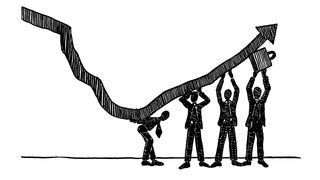“A crisis is a terrible thing to waste!” said my professor of economics at Stanford University and now Nobel laureate, Paul Romer. He was highlighting the virtue of crises: they create a chance for transformational change.
We are now face to face with this very opportunity. The question in front of us is “What changes should we make”?
In 2019, I travelled from Silicon Valley to Washington for the inaugural CEO summit of the American Australian Business Council, which was focused on the economic ties that bind the US and Australia.
Little did I know then that the most important lesson for Australia was not embedded in the economic data discussed, but was instead embodied by two US government participants: Kevin Hassett and Larry Kudlow, the leaders of the US Council of Economic Advisors (CEA) and the US National Economic Council (NEC), respectively.
In light of a much-changed world and global economy from the COVID-19 crisis, it’s these speakers’ organisations themselves that carry a great lesson for Australia.
Together, the Council of Economic Advisors and the National Economic Council have kept economic reform at the forefront of the executive office agenda, while maintaining a vibrancy of economic thought within the White House and government.
To understand the opportunity for Australian economic policy that these councils hold, it’s important to review their genesis.
In 1946, the United States still wore the economic wounds of the Great Depression and there was a growing fear that the economy, without the government stimulus of the war machine, would fall into depression.
In this environment, the Employment Act of 1946 was passed as a legislated safeguard for economic reform and planning. Many current institutional elements of economic governance and policy were born in this Act. Among them is the president’s CEA and its annual economic report.
The importance of the Employment Act cannot be overstated – not just with respect to individual reforms, but in the attitudinal change toward economic policy of the executive branch of government, from one that was ad hoc to one that is long-term, systematic and strategic.
From this organisational change flowed policy reforms that stimulated the US economy - perhaps best initially demonstrated in 1964 when the CEA modelled and then lobbied for tax cuts which the Johnson administration ultimately adopted ushering in an era of immense economic growth.
Nearly half a century later in 1992, with a recession in full swing and unemployment at twice 2019 rates, Democratic candidate Bill Clinton’s campaign said: “It’s the economy, stupid”.
After winning the presidency largely on this mantra, Clinton created the National Economic Council. This council, working alongside the CEA, has become a potent facilitator of White House economic policy by coordinating departments as new economic policy is implemented.
In this way, it is similar to how the National Security Council manages White House policy on security issues.
Ultimately, the CEA is a strategic body that provides the president with his own think-tank of economic analysis, while the NEC is a tactical body that coordinates economic policy across the government for the president.
There is a desperate need for creative, strategic, long-term economic policy leadership at the federal level in Australia.
Together, the CEA and NEC have kept economic reform at the forefront of the executive office agenda, while maintaining a vibrancy of economic thought within the White House and government.
Now, Australia finds itself battling an economic crisis, the likes of which hasn't been seen since the Great Depression of the 1930s. In fact, we are in new territory for an entire generation of Australians, since the country hasn't experienced a recession in 30 years.
The initial government response to the prospect of a protracted global recession and unemployment approaching 10 per cent has been a balance sheet rapidly increasing with debt. There is, therefore, a desperate need for creative, strategic, long-term economic policy leadership at the federal level in Australia.
Economic reforms that Australia began undertaking in the 1970s have been integral to Australia now enjoying one of the world’s highest living standards.
However these reforms have mostly been ad hoc. Given the potential for volatility of a globally connected economy, Australia needs a standing body to provide consistent expert advice on the economy and economic policy.
An Economic Policy Group within the office of Prime Minister and Cabinet, would be a significant weapon in responding to the rapidly accumulating challenges.
This Economic Policy Group would feature an Economic Council, a ministerially independent body made up of expert economist appointees, similar to the CEA.
This council would also provide a platform for creative, cutting-edge economic policy that is easily refreshed through new appointments.
Additionally, the infrastructure within the Domestic Policy Group that already coordinates economic policy across government, similar to the NEC, should be pulled into a stand-alone Economic Policy Group to join policy creation effectively with policy implementation, elevating the visibility of this work.
Last month, Prime Minister Scott Morrison said the “jobs and skills we'll need as we come out of the crisis are not likely to be the same as those that were lost.”
In the same vein, he should recognise that the sort of economic policy creation and coordination he and his team will need to come out of this crisis are not likely to be the same as before either.






